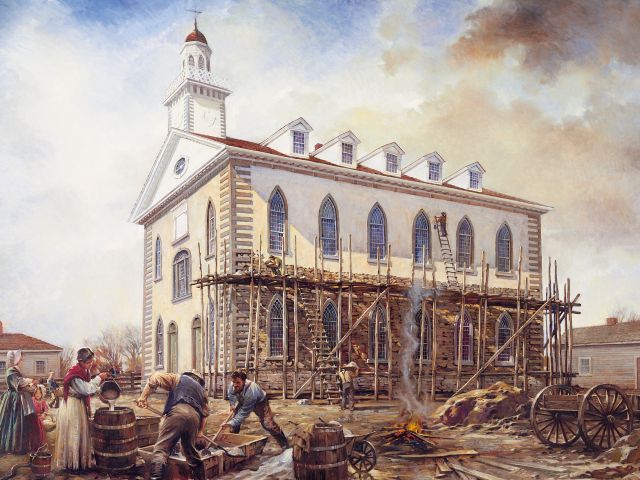by Cassandra Hedelius

In D&C 88, the Lord instructed Joseph that the School of the Prophets should always begin with a striking demonstration of affection between the participants:
“[L]et the teacher arise, and, with uplifted hands to heaven, yea, even directly, salute his brother or brethren with these words:
“Art thou a brother or brethren? I salute you in the name of the Lord Jesus Christ, in token or remembrance of the everlasting covenant, in which covenant I receive you to fellowship, in a determination that is fixed, immovable, and unchangeable, to be your friend and brother through the grace of God in the bonds of love, to walk in all the commandments of God blameless, in thanksgiving, forever and ever. Amen.” (D&C 88:132-133)
Unfortunately this recitation wasn’t enough to produce harmony among the brethren, because in D&C 95, received six months later, the Lord told Joseph: “contentions arose in the school of the prophets; which was very grievous unto me, saith your Lord; therefore I sent them forth to be chastened.” (D&C 95:10)
A superficial reading of these passages supports what I call the Gospel of Facebook (though I ought to update it to the Gospel of Instagram): that what’s most important to God is our love for one another and harmony with one another and affirmation of one another. Basically, niceness as the core of the gospel. This philosophy holds that those who are struggling not only to keep some commandments, but even to maintain faith that those commandments actually are from God and important to keep, need to be treated positively and never exposed to testimony about the importance of righteousness and purity.
One example I found on Instagram was a claim that activism in opposition to fundamental doctrines regarding sex, gender, and family was “seek[ing] to nurture a Zion/Beloved community.” The implication is that Zion requires opposing church teachings and instead emphasizing inclusion of those who are not ready to keep and support the Lord’s commandments.
I hasten to include the obligatory aside that kindness toward literally everyone, no matter their belief or degree of faith or strictness in keeping their covenants, is important and required of all disciples of Christ.
But Zion is more than kindness; Zion is righteousness and purity. Zion is more than unity; Zion is a collective worthiness to see God.
First, Zion always means building temples. In D&C 94:1, the Lord charged Joseph to “commence a work of laying out and preparing a beginning and foundation of the city of the stake of Zion, here in the land of Kirtland, beginning at my house.” In D&C 95, Joseph and other church leaders were chastised not just for contention in the school of the prophets, but for neglecting to build the temple. “[I]t is my will that you should build a house. If you keep my commandments you shall have power to build it. If you keep not my commandments, the love of the Father shall not continue with you, therefore you shall walk in darkness” (vv. 11-12). Clearly, the temple is not an optional luxury that Zion could do without. It’s a fundamental point of building Zion at all. There is no Zion without a temple.
Second, Zion and its temple require personal purity. Those who break the commandments lose the love of the Father and walk in darkness, which is serious enough, but moreover:
“The ax is laid at the root of the trees; and every tree that bringeth not forth good fruit shall be hewn down and cast into the fire. I, the Lord, have spoken it.” (D&C 97:7)
Gospel of Facebook adherents might protest that “good fruit” means kindness and inclusion in defiance of church teachings, but the next verse clarifies:
“[A]ll among them who know their hearts are honest, and are broken, and their spirits contrite, and are willing to observe their covenants by sacrifice—yea, every sacrifice which I, the Lord, shall command—they are accepted of me.” (D&C 97:8)
Sometimes the Lord asks for very difficult sacrifices: Abraham’s son, the pioneers’ homes and settled lives, our natural selves and strong desires.
Zion is welcoming of absolutely everyone who will sacrifice whatever the Lord requires. But to those who will not, “he that is found unworthy of this salutation shall not have place among you; for ye shall not suffer that mine house shall be polluted by him.” (D&C 88:134)
“[I]nasmuch as my people build a house unto me in the name of the Lord, and do not suffer any unclean thing to come into it, that it be not defiled, my glory shall rest upon it; Yea, and my presence shall be there, for I will come into it, and all the pure in heart that shall come into it shall see God. But if it be defiled I will not come into it, and my glory shall not be there; for I will not come into unholy temples.” (D&C 97:15-17)
In the simplest explanation, Zion is the pure in heart. (D&C 97:21) Pure hearts stand as witnesses of truth, and invite all to come to Christ and be perfected in Him, in hope that we can all worship and rejoice together.
I hope we don’t let debates distract us from joyfully spreading the glorious invitation:
Come to Zion! Come to Zion!
Angels are descending from celestial worlds on high,
And to man their power extending,
That the Saints may homeward fly.
Come to Zion, come to Zion!
For your coming Lord is nigh.
(Hymns no. 7)
More Come, Follow Me resources here.
 Cassandra Hedelius studied Political Science in Oklahoma and Law in Colorado. She currently lives in Aurora, Colorado and cares full time for her three young children and cat.
Cassandra Hedelius studied Political Science in Oklahoma and Law in Colorado. She currently lives in Aurora, Colorado and cares full time for her three young children and cat.
